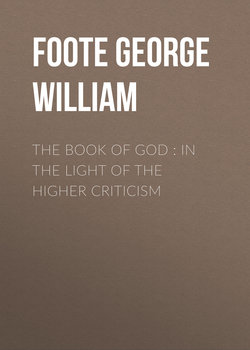Читать книгу The Book of God : In the Light of the Higher Criticism - Foote George William - Страница 4
IV. MIRACLES AND WITCHCRAFT
ОглавлениеDr. Farrar, as we have seen, holds that the Bible is not a revelation in science. The inspired writers were, in such matters, left to their natural knowledge. The Holy Spirit taught them that God made the world and all which it inhabits; but how it was made they only conjectured. The truth, in this respect, was left to the discovery of later ages.
This is a pretty and convenient theory, but it does not provide for every difficulty in the relationship between science and the Bible. There still remain the questions of miracles and witchcraft.
Dr. Farrar does not discuss these questions thoroughly. He only ventures a few observations. In his opinion, the two miracles of the Creation and the Incarnation "include the credibility of all other miracles." We agree with him. Admit creation out of nothing, and you need not be astonished at the transformation of water into wine. Admit the birth of a boy from a virgin mother, and you need not raise physiological objections to the story of a man being safely entertained for three days in a whale's intestines. It is absurd to strain at gnats after swallowing camels. For this reason we are unable to understand Dr. Farrar's fastidiousness. He is ready to believe that some miracles are mistaken metaphors, that some were due to the action of unnoticed or ill-understood natural causes, and that others were providential occurrences instead of supernatural events. All this, however, is but a concession to the sceptical spirit. It is throwing out the children to the wolves. It may stop their pursuit for a little while, but they will come on again, and flesh their jaws upon the parents.
A mixed criterion of true miracles is laid down by Dr. Farrar. They must be (1) adequately attested, and (2) wrought for adequate ends, and (3) in accordance with the revealed laws of God's immediate dealings with man. The second and third conditions are too fanciful for discussion. They are, in fact, entirely subjective. The first condition is the only one which can be applied with decisive accuracy. The miracles must be adequately attested. But was it not David Hume who declared that "in all history" there is not a single miracle attested in this manner? And did not Professor Huxley say that Hume's assertion was "least likely" to be challenged by those who are used to weighing evidence and giving their decision with a due sense of moral responsibility?
It is easy enough to sneer at Hume. It is just as easy to answer what he never said. What the apologists of Christianity have to do is to take a single miracle of their faith and show that it rests upon adequate evidence. Anything short of this is intellectual thimble-rigging.
Dr. Farrar does not face this dreadful task. He treats us, instead, to some personal observations on the Fall, the Tower of Babel, Balaam's ass, Joshua's arrest of the sun and moon, and Jonah's submarine excursion. Let us examine these observations.
No Christian, says Dr. Farrar, is called upon to believe in an actual Garden of Eden and an actual talking serpent. Christians have believed in these things by the million. But that was before the clergy invented "the Higher Criticism" to disarm "infidelity." They know better now. The story of the Fall is false as a narrative. It is true as a "vivid pictorial representation of the origin and growth of sin in the human heart." All the literature of the world has failed to set forth anything "comparable to it in insight." Therefore it is "inspired."
